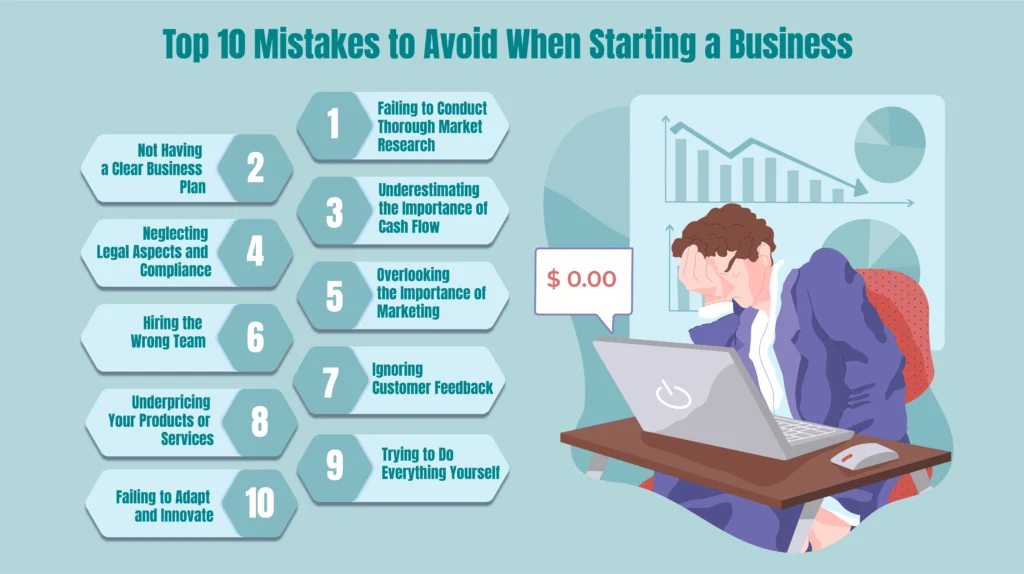Top 10 Mistakes to Avoid When Starting a Business
Starting a business is an exhilarating journey, filled with dreams of innovation, independence, and financial success. However, the path to entrepreneurial triumph is fraught with challenges, and the early stages of building a business are where most mistakes happen. These missteps can be costly, both financially and in terms of time, so it’s essential to learn from those who have gone before you.
In this post, we’ll explore the top 10 mistakes to avoid when starting a business. By steering clear of these common pitfalls, you’ll set yourself up for success, minimize risks, and maximize your chances of building a thriving enterprise. Whether you’re launching a tech startup, opening a local cafe, or venturing into e-commerce, these insights will help you navigate the complexities of entrepreneurship with greater confidence.

1. Failing to Conduct Thorough Market Research
When starting a business, many entrepreneurs are eager to dive into product development and marketing, often neglecting one of the most crucial steps—market research. Without a deep understanding of your target market, you may end up creating a product or service that doesn’t meet the needs or preferences of potential customers.
Example: Imagine launching a new gourmet coffee brand in a city where there are already numerous well-established coffee shops with loyal customer bases. Without thorough market research, you might overlook the saturation in the market, leading to disappointing sales and wasted investment.
How to Avoid This Mistake:
Invest time in conducting comprehensive market research. Analyze your target audience, competitors, and market trends. Use surveys, focus groups, and data analysis tools to gather insights that will inform your business strategy. A solid understanding of your market will help you tailor your offerings to meet customer demands and differentiate your brand.
2. Not Having a Clear Business Plan
A clear and detailed business plan is essential when starting a business. It serves as a roadmap, guiding you through each stage of your venture and helping you stay focused on your goals. However, many entrepreneurs skip this step, thinking they can “wing it” as they go along. This approach often leads to confusion, misallocation of resources, and ultimately, failure.
Example: Consider a startup founder who decides to open a retail store without a business plan. As a result, they struggle with cash flow management, fail to set clear milestones, and lack a strategy for scaling the business. This lack of planning can lead to the store closing down within the first year.
How to Avoid This Mistake:
Draft a comprehensive business plan that outlines your business objectives, target market, revenue model, marketing strategy, and financial projections. Regularly review and update your plan as your business grows. A well-thought-out business plan will not only keep you on track but also attract potential investors and partners.
Related Article: 15 Successful Tips to Start Your Business Journey
3. Underestimating the Importance of Cash Flow
Cash flow is the lifeblood of any business, and poor cash flow management is one of the most common reasons businesses fail. When starting a business, it’s easy to get caught up in the excitement of generating revenue and overlook the importance of managing cash flow effectively.
Example: A small manufacturing company might secure a large order from a major retailer, but if they haven’t planned for the cash flow needed to purchase raw materials and cover operating expenses until the invoice is paid, they could quickly run into financial trouble.
How to Avoid This Mistake:
Develop a cash flow forecast and monitor it regularly. Make sure you have enough working capital to cover your expenses, especially during the early stages of your business. Consider setting up a line of credit or securing other forms of financing to bridge any cash flow gaps. Being proactive in managing your cash flow will help you avoid unnecessary financial stress.
4. Neglecting Legal Aspects and Compliance
When starting a business, it’s crucial to ensure that all legal and regulatory requirements are met. Neglecting this aspect can lead to fines, lawsuits, and even the closure of your business. This includes everything from registering your business, obtaining necessary licenses and permits, to understanding tax obligations and complying with employment laws.
Example: An entrepreneur opens a food truck without securing the required health permits. After a few months of operation, they’re shut down by local health authorities, resulting in a loss of income and reputation.
How to Avoid This Mistake:
Consult with a legal professional to ensure that your business is fully compliant with all local, state, and federal regulations. Stay informed about any changes in laws that could affect your business. Taking care of legal aspects from the start will protect your business and give you peace of mind.
5. Overlooking the Importance of Marketing
Many new business owners assume that customers will flock to their products or services as soon as they open their doors. However, in today’s competitive marketplace, effective marketing is crucial for attracting and retaining customers. Failing to invest in a well-rounded marketing strategy is a common mistake that can stifle growth.
Example: A tech startup launches a revolutionary app but doesn’t allocate enough resources to marketing. As a result, the app fails to gain traction, and the business struggles to achieve its revenue targets.
How to Avoid This Mistake:
Develop a comprehensive marketing plan that includes digital marketing, social media, content marketing, and traditional advertising. Focus on building a strong brand presence and engaging with your target audience through various channels. Remember, even the best products need effective marketing to succeed.
6. Hiring the Wrong Team
The success of your business largely depends on the people you hire. When starting a business, it’s tempting to hire quickly to fill positions, but rushing the hiring process can lead to bringing on employees who are not the right fit. This can result in decreased productivity, poor company culture, and high turnover.
Example: A small business owner hires a close friend as a manager without considering their lack of experience in the industry. The manager struggles to meet performance expectations, leading to operational inefficiencies and frustration among other employees.
How to Avoid This Mistake:
Take your time to hire the right people. Clearly define the roles and responsibilities for each position and seek candidates who not only have the necessary skills but also align with your company’s values and culture. Consider implementing a thorough interview process and involving key team members in hiring decisions. Investing in the right team from the start will set your business up for long-term success.
7. Ignoring Customer Feedback
When starting a business, it’s easy to get attached to your initial ideas and assumptions. However, failing to listen to customer feedback can result in missed opportunities for improvement and innovation. Customer feedback is a valuable resource that can help you refine your products, services, and overall business strategy.
Example: A new restaurant receives consistent feedback from customers that the menu is too limited, but the owner dismisses these comments, believing that the current offerings are sufficient. Over time, customers start to dwindle, and the restaurant struggles to stay afloat.
How to Avoid This Mistake:
Encourage and actively seek customer feedback through surveys, reviews, and direct communication. Use this feedback to make informed decisions and adapt your business to better meet customer needs. By valuing and acting on customer input, you can build stronger relationships and increase customer loyalty.
8. Underpricing Your Products or Services
Pricing is a critical aspect of starting a business, and getting it wrong can have serious consequences. Many new entrepreneurs make the mistake of underpricing their products or services in an attempt to attract customers. However, this strategy can lead to unsustainable profit margins and create the perception that your offerings are of low value.
Example: A freelance graphic designer offers services at a significantly lower rate than competitors, thinking it will help build a client base. While they attract some clients, they find it difficult to cover their costs and eventually struggle to stay in business.
How to Avoid This Mistake:
Conduct thorough market research to determine a fair and competitive pricing strategy. Consider your costs, target market, and the perceived value of your offerings. It’s important to strike a balance between attracting customers and maintaining healthy profit margins. Don’t be afraid to charge what your products or services are worth.
9. Trying to Do Everything Yourself
When starting a business, many entrepreneurs fall into the trap of trying to do everything themselves. While it’s important to be hands-on in the early stages, attempting to manage every aspect of the business on your own can lead to burnout and hinder growth. Delegating tasks and seeking help when needed is crucial for scaling your business.
Example: A small business owner insists on handling everything from accounting to marketing to customer service. As the business grows, they become overwhelmed, and the quality of work begins to suffer, leading to dissatisfied customers and declining sales.
How to Avoid This Mistake:
Identify the areas of your business that can be delegated to others, whether through hiring employees, outsourcing, or using technology to automate tasks. Focus on the aspects of your business that require your expertise and attention. Delegating effectively will free up your time to focus on strategic decision-making and growth.
10. Failing to Adapt and Innovate
The business landscape is constantly evolving, and failing to adapt to changes can lead to stagnation or failure. When starting a business, it’s important to remain flexible and open to innovation. Companies that are unwilling to pivot or explore new ideas often find themselves left behind by more agile competitors.
Example: A retail business relies solely on in-store sales and ignores the growing trend of e-commerce. As more customers turn to online shopping, the business struggles to maintain its customer base and eventually faces closure.
How to Avoid This Mistake:
Stay informed about industry trends and be willing to adapt your business model when necessary. Encourage a culture of innovation within your team and be open to experimenting with new ideas and technologies. By remaining adaptable, you’ll be better positioned to respond to changes in the market and seize new opportunities.
Conclusion
Starting a business is a rewarding yet challenging endeavor, and avoiding common mistakes is key to laying a strong foundation for success. By conducting thorough market research, developing a clear business plan, managing cash flow effectively, and staying adaptable, you’ll increase your chances of building a thriving business.
Remember, the journey of entrepreneurship is a continuous learning process. Stay informed, be proactive, and don’t be afraid to seek help when needed. By avoiding these top 10 mistakes, you’ll be well on your way to achieving your business goals.
Now that you’re equipped with the knowledge to avoid these pitfalls, it’s time to take action. Start by reviewing your business plan, assessing your current strategies, and making any necessary adjustments. Your future success depends on the steps you take today.






